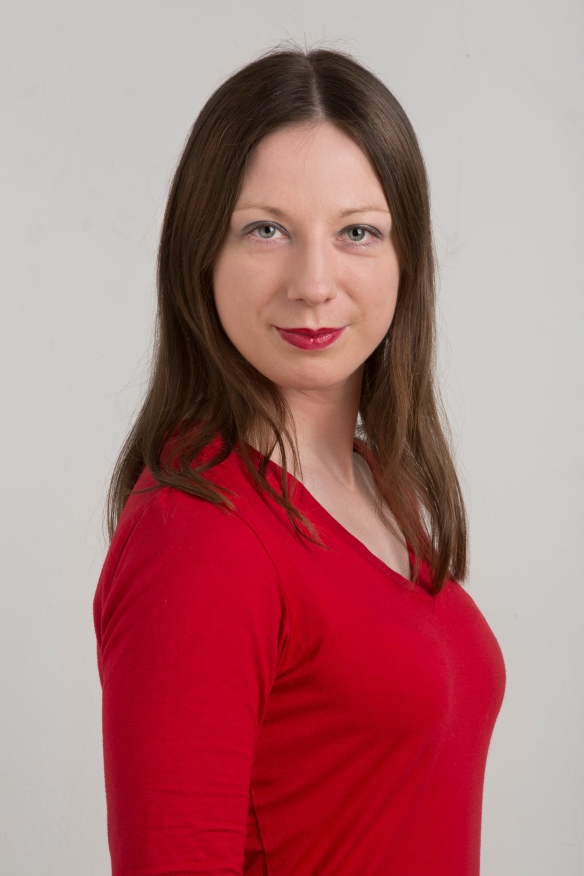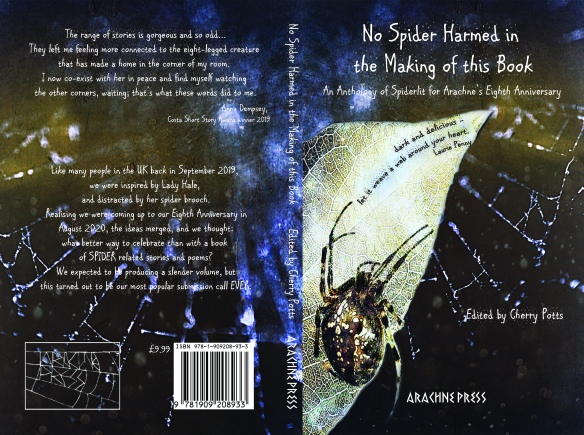Twenty-eighth in a series of author-to-author interviews to distract them, and you, from lockdown torpor.

Joanne LM Williams
Joanne L.M. Williams (No Spider Harmed in the Making of this Book, We/She) interviewed by Laura Besley (Story Cities).
Laura: You write a mixture of short stories, flash fiction and poetry. Do you set out to write in a particular form, or do you let the piece develop organically?
Joanne: When I start writing I might not always know exactly how the idea or plot is going to play out, or what the ‘ending’ is going to be, but I do know what form it’s going take, because the processes by which I write a poem, or a short story, or a flash fiction are very different. So, yes, for each piece I suppose I do set out to write in a particular form. Or rather the initial idea I have is for a piece of writing in a specific form.
I can only think of one exception to this: Before I had really heard of flash fiction I had an idea for a short story that I could never quite get to work out. It turned out that idea was supposed to be a flash fiction – and once I was introduced to drabbles, that story idea became a 100 word piece called One Hundred Years.
Laura: Your poem ‘Gifted’ has been selected for the upcoming Arachne Press anthology, No Spider Harmed in the Making of this Book, and focuses on the mythological Arachne. Did you draw from your background in History for inspiration?
Joanne: Not especially – I have a history degree, but it didn’t cover the classical world. My degree is in what Oxford, slightly archaically calls ‘Modern History’, by which they mean everything from around 500 AD onwards. Ancient History is a separate department.
However I’ve been fascinated by all kinds of mythology, and especially Greek mythology, since I was quite a young child. I’ve played around with a lot of the myths in my writing before, but I’ve never written about Arachne, and this seemed a good opportunity. I really enjoyed getting under the skin of a version of the character that I imagined.
Laura: In We/She (short stories by women from Liars’ League, Arachne Press, 2018) your story Cages is written from the point of view of a dragon. Do you enjoy the challenge of writing from unusual perspectives?
Joanne: Very much so – although it’s perhaps less of a challenge and more of a desire to give those characters a voice. As a young reader I was usually much more interested in the secondary characters, the sidekicks and the ‘baddies’ in a story, than I was in heroes and heroines, so as a writer I often like to explore where those characters are coming from, and what their own stories are.
It’s also a device which allows me to explore the experience of being othered in various ways: Most of my central characters are marginalised, and many of them are queer.
Laura: As well as Cages you have had several other stories performed at Liars’ League in London and Hong Kong. Do you enjoy listening to your stories being read aloud by others?
Joanne: Usually, yes! It’s certainly an interesting experience. I tend to think of any piece of writing as a living thing, or a conversation, that’s interpreted by its readers, listeners or performers anyway, but that’s made particularly obvious when someone else is reading it to an audience in front of you. Sometimes an actor will bring out elements in something that I hadn’t even fully realized were there – often humorous moments, or poignant ones.
When I first heard Cages read out, by the wonderful Susan Moisan, she drew laughs and responses from the audience in a few places I wasn’t necessarily expecting, which was very gratifying! It was such a pleasing delivery that I have to admit, when I later read out that story myself, I borrowed heavily from her performance in places.
Still, there can be some anxiety in handing over something you care about so much. A bit of me doesn’t like giving up creative control, but that’s something it’s good for me to learn to do. I’ve only ever had one bad experience, with one group, where I wasn’t really happy with the end result – but that was a situation where I wasn’t able to speak directly either to the actor performing my piece, or to the person advising/directing. Liars League are great because they generally give an opportunity for the writer and actor to discuss the reading in advance.
Laura: One area in which you enjoy performing is competitive dance. Do you find that movement unlocks creativity?
Joanne: Dance definitely helps me to unlock my feelings – it’s common for me to go into a dance practice and find myself working through a mood I hadn’t even realised I was in. It’s incredibly helpful in that respect.
I do also find dancing in a style that has a formal structure and technique can drive creativity in the same way that writing in a fixed form can. I love ballroom dancing for the same reason I love metric poetry: Something about the juxtaposition between the intense emotions being expressed and having a tight form to work within has creative power. I have a very long-standing project I’m playing with at the moment, writing poems based on dances where the metre of the poem matches the rhythm of the dance, as I want to explore that similarity.
Laura: Like many writers, you also have a day job, in your case working in theatres in an organisational role. Do you find that a job which requires a completely different skill set allows more, or less, space for creativity in your free time?
Joanne: I’ve always written, and as a child had ambitions of being solely a writer, but I realised whilst I was still in my early twenties that it wasn’t something I could do full-time. I’m an extrovert and like being around and working with people too much – if I spend much time alone it affects both my mood and my productivity very negatively.
Theatre working hours can be long and anti-social, which can make fitting in time for writing, as well as dancing and studying, tricky. But at the same time, it’s absolutely necessary for me to work around people in a job I love for me to then have the emotional energy and ability to write. And even though I don’t write specifically for the stage, getting to see so much creative content as part of my job is beneficial too. Just as reading as much as possible is useful to a writer, so is watching a lot of theatre.
Laura: When you read something that you think is perfection, how does it make you feel? Does it spur you on, or intimidate you?
Joanne: Oh it inspires me, hugely. That’s why I want to write ultimately – the sheer excitement when you read something wonderful. I want to be able to create that sort of magic with words too.
Laura: As writers, we have to deal a lot with rejection. Do you have a ‘tried and tested’ method, or does it depend on the mood you’re in or the piece that you submitted?
Joanne: I don’t really have a method per se. The majority of the time rejections don’t bother me too much – I know what the statistics are like for almost all writers in terms of rejections per accepted piece.
Of course, there’ll sometimes be a ‘no’ that stings more than I was expecting it to – perhaps if I’ve grown especially fond of a piece of work, or conversely, if it was especially difficult to complete but I thought I’d cracked it.
At the end of the day though, I can always move on fairly quickly. In a way I know I’m lucky, because writing is my ‘side-hustle’ so to speak, and my income doesn’t depend on it.
Laura: Do you have particular writing goals for the next year, or years? Do you, for example, want to write a novel or a play? Do you see writing as part of your career, or more of a hobby?
Joanne: I’m aiming to finish the collection of poems based on dances mentioned above, and I’m also looking to write some stories in styles that are new to me. I have the beginnings of some ghost stories brewing for example, and I’d like to write more comedy.
I’ve no immediate plans to write a novel again. I attempted one years ago, completed it, got feedback and put it through several edits. I then never submitted it anywhere because by the time it was finished I no longer believed in it, either artistically or emotionally. I find I enjoy the process of writing short stories and poems much more. As for a play, the problem I have is that the thing I find hardest of all to write is realistic-sounding present-day dialogue! Of course, not all theatre takes the same form, so never say never, but it’s not among my short-term plans.
To answer the last part of the question, even though writing isn’t my primary job, and it doesn’t make me money, I do see it as part of my career, yes. I’ve always been interested in doing lots of different things or jobs; some of them pay me and some of them don’t, but they’re all important and part of my ‘portfolio career’.
Laura: How have you been managing in lockdown? Have you been able to use this time to write more, or are you – like many others – struggling to put pen to paper? If you are managing to write, what are you working on?
Joanne: It’s been similar to before in terms of productivity if I’m honest. There’s lots of extra time, but my ability to write fluctuates – some days I’m inspired and write in a burst, and other days are just not writing days. I’m afraid my writing habits have never been especially consistent, and that hasn’t changed. One thing I am finding useful though, is an online writing group that a friend is running for a few hours each evening – I don’t join every night, but when I do it’s a good motivator.
I’m working on two pieces – one short story and one poem – for two upcoming deadlines at the moment. They’re both inspired by, or are responses to, famous pieces of literature (respectively the novel Little Women, and a Robert Southwell poem for Arachne’s Solstice Shorts call out).
However, that’s about all my two projects have in common – they’re very different in tone as well as form. I’m also busy redrafting some existing stories, including a couple of modern fairytales, and a dramatic monologue from the point of view first Mrs Rochester.
Like this:
Like Loading...
 Technically it was our 8th anniversary yesterday, as the day we registered the company in 2012, but eight is an important number for Arachnids, so we are celebrating throughout August (eighth Month) for our Eighth year.
Technically it was our 8th anniversary yesterday, as the day we registered the company in 2012, but eight is an important number for Arachnids, so we are celebrating throughout August (eighth Month) for our Eighth year.







